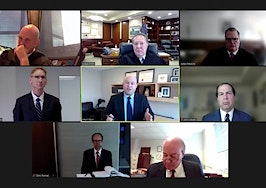With the size of the residential real estate market estimated to exceed $2 trillion in 2021 and the volume of real estate commissions forecast to exceed $100 billion, there is much at stake as antitrust scrutiny advances in real estate.
As a result, 2022 promises to be another active year of antitrust law developments affecting the industry. This year will see government antitrust enforcement in real estate and private antitrust litigation in numerous trial and appellate courts across the country involving fundamental and long-standing real estate industry practices.
The competition law cases and investigations that are ongoing in 2022 show that the Department of Justice and the Federal Trade Commission (FTC) will remain active enforcers in the real estate business, especially given the White House’s inclusion of the brokerage industry in its 2021 Executive Order on Promoting Competition.
To add to the major headwinds the industry is facing, the plethora of private litigations challenging the rules and policies of the National Association of Realtors (NAR) regarding broker commissions will come to a head in various forums. To get a sense of where antitrust law is headed in the real estate industry, a look at the recent past provides some telling signs.
White House and FTC focus on real estate
On July 9, 2021, President Joe Biden issued a wide-ranging executive order intended to promote competition in numerous sectors of the economy through 72 specific initiatives. One of the initiatives states that in order to “address persistent and recurrent practices that inhibit competition,” the chair of the FTC is “encouraged … to exercise the FTC’s statutory rulemaking authority” in several areas, including “unfair tying practices or exclusionary practices in the brokerage or listing of real estate.”
In December 2021, the FTC released its Statement of Regulatory Priorities for 2022 and noted it will explore the “benefits and costs” of rulemaking related to real estate listing and brokerage. The FTC, led by Chair Lina Khan, started rulemaking on impersonation fraud. But with a 2-2 deadlock among FTC commissioners (and two commissioners opposed to rulemaking in general), rulemaking on real estate industry practices will have to wait until there is a fifth commissioner. (Biden’s resubmitted the nomination of Georgetown University law professor Alvaro Bedoya as FTC commissioner in early January as the Senate began its new session).
Congress and real estate
The majority of the antitrust focus at the federal legislative level in 2021 focused on bills to change the antitrust laws to address the growing clout of large technology companies, in both mergers and alleged exclusionary conduct.
Related to those bills, the antitrust subcommittee of the Senate Judiciary Committee held a hearing in December 2021 on the impact of consolidation and monopoly power on innovation. One of the hearing’s witnesses, a law professor and former DOJ official, testified that there has been an “absence of meaningful innovation in the real estate brokerage market,” especially compared to the financial brokerage and car resale markets.
The result of this purported lack of meaningful innovation is that the United States has “some of the highest real estate brokerage fees in the developed world,” the witness, Roger P. Alford, said, whereas other developed countries have “drastically lower” real estate commissions.
This testimony notwithstanding, there are no antitrust-related bills pending before Congress that specifically target competition in the real estate industry.
NAR v. DOJ
The highest-profile antitrust development in real estate in 2021 involved a lawsuit by the NAR, the largest trade association in the country, challenging the DOJ’s withdrawal from a consent decree.
In November 2020, the DOJ filed a complaint and proposed settlement to resolve an investigation into several NAR real estate brokerage rules and practices. In December 2020, the DOJ filed its competitive impact statement explaining why it believed NAR’s practices violated Section 1 of the Sherman Act.
Notably, the DOJ challenged NAR’s rules that:
- Prohibited an MLS from disclosing to potential homebuyers the amount of commission a buyer-broker would earn from a purchase
- Allowed buyer-brokers to advertise their services as free to homebuyers
- Enabled buyer-brokers to filter MLS listings based on commissions offered and exclude lower commission homes from a buyer’s consideration
- Limit lockbox access to NAR-affiliated brokers
As the Tunney Act process unfolded, however, DOJ sought to amend the proposed final judgment to eliminate any potential limitation on DOJ’s ability to investigate and challenge NAR’s practices in the future. NAR would not agree.
As a result, in July 2021 DOJ unilaterally withdrew from the settlement and voluntarily dismissed its complaint before the federal court had held a public interest hearing or entered a final judgment. A few days later, DOJ issued a new Civil Investigative
Demand to NAR to investigate numerous rules and practices, notably the NAR’s Participation Rule (which requires agents listing homes on an MLS to make blanket unilateral offers of compensation to other MLS participants) and NAR’s Clear Cooperation Policy (which requires MLS members to list a home on the MLS within one business day of marketing to the public).
Dissatisfied with DOJ’s withdrawal from the settlement, NAR filed a petition in federal court in September 2021 to quash or modify the new DOJ CID. NAR contended that the Antitrust Division’s agreement in 2020 to resolve its investigation of NAR was binding and that DOJ agreed to close its investigation of the Participation Rule and Clear Cooperation Policy.
In October 2021, DOJ responded, arguing that it never made a commitment to refrain from investigating NAR in the future and is not barred from doing so. NAR filed its reply brief in November and also agreed to change three of the four rules that DOJ had challenged as antitrust violations, even though DOJ had withdrawn its lawsuit.
In January 2022, DOJ informed the court of its view that briefing is complete and the issue is ripe for ruling. A decision from the court (and any potential appeal) will show the direction of DOJ enforcement in real estate.
Antitrust litigation against NAR over pocket listings
In May 2020, Pocket Listing Service, an operator of pocket listings where properties for sale are shared privately, off-market, and not placed in a multiple listing service, sued NAR and three regional MLSs contending that NAR’s Clear Cooperation Policy, which requires brokers to submit their listing into their MLS within one business day of marketing the property to the public, violated Section 1 of the Sherman Act as well as California’s state antitrust law.
In February 2021, a federal judge dismissed the case for lack of antitrust injury because PLS had not alleged that the NAR policy had harmed homebuying or homeselling consumers, or competition in the real estate industry. To the contrary, the court held that the policy has “some plainly pro-competitive aspects.”
PLS appealed to the Ninth Circuit, where the Antitrust Division filed an amicus brief flagging some errors of antitrust law committed by the district court but taking no position on the merits of PLS’s antitrust claims.
Oral argument on PLS’s appeal was held in mid-January 2022, so a federal appellate decision affecting the future of the Clear Cooperation Policy and pocket listings is likely later this year.
Also on to the Ninth Circuit is a similar antitrust lawsuit brought by another tech company seeking to share off-MLS listings, Top Agent Network, challenging the Clear Cooperation Policy. TAN, which labeled itself a private MLS where the top agents by sales volume could engage in private sales, claimed that NAR was engaged in a group boycott of agents who want to market off-MLS.
In August 2021, a federal court dismissed TAN’s case for lack of antitrust injury, holding that TAN’s loss of agent members did not harm competition because TAN’s goal was to limit competition for home sales and curtail the dissemination of property listings. In September 2021, TAN appealed, teeing up another ruling affecting the future of NAR’s listing rule.
REX v. NAR and Zillow
In March 2021, Real Estate Exchange (REX), a technology and brokerage company, sued NAR and real estate aggregator Zillow (and its Trulia subsidiary) under Section 1.
REX contended that Zillow agreed to adopt NAR’s rules for MLS listing data, including a Buyer Agent Commission Rule whereby a seller’s agent must include an offer of commission to a buyer’s agent. Zillow then placed REX’s property listings on a separate “other listings” tab, consistent with an NAR Segregation Rule that allows MLSs to require that listings obtained through MLS internet data exchange feeds be displayed separately from non-MLS listings from other sources like REX. REX claimed this segregation caused views of its listings to plummet, causing a drop in sales.
In June 2021, the court denied REX’s motion for a preliminary injunction, but in September 2021 denied motions to dismiss by NAR and Zillow, finding that REX adequately alleged an agreement by Zillow to use NAR’s rules to restrain trade and harm competition.
REX then amended its complaint, adding a defamation claim, leading to another motion to dismiss by NAR to dismiss REX’s Section 1 claim. In December 2021, the court issued a brief order rejecting the motion to dismiss, noting that despite NAR’s contentions, the amended complaint did not contain new allegations that supported dismissal of REX’s antitrust case (but that the plaintiff’s defamation and Lanham Act claims would be dismissed with prejudice).
Zillow and NAR answered REX’s amended complaint, while NAR added a counterclaim of false advertising under the Lanham Act alleging that REX has falsely claimed that NAR’s MLS rules have “artificially inflated commissions [and] hindered the development of technology for home listings.”
REX v. Oregon
Seeking to disrupt the real estate world, REX also took aim at the state of Oregon. In December 2020, REX sued the governor of Oregon and several state real estate agencies and officials after REX received a letter that its buyer rebate program violated the state’s law prohibiting sharing of real estate commissions with anyone who does not possess a real estate license.
REX asserted that the enforcement of the policy preventing REX from offering commission rebates to customers violates Section 1 of the Sherman Act by preventing new entrants into the brokerage market and by protecting incumbent brokers and their inflated commissions.
In December 2021, an Oregon federal judge dismissed the lawsuit, finding that the state officials enforcing the anti-rebate law were entitled to state action immunity under Parker v. Brown and that REX had failed to state a plausible Section 1 claim because all the defendants were state executive branch members, not separate economic actors restraining competition. In January 2022, REX appealed to the Ninth Circuit.
Consumer class actions against NAR over broker commissions
NAR is also fighting several consumer class actions on multiple fronts about its broker compensation rules, which are in the midst of discovery and headed toward trial. 2022 will bring dispositive motions and class certification fights.
In Sitzer v. NAR, plaintiffs filed a Section 1 class action in 2019 targeting the NAR’s commission rules, including the Participation Rule, which requires sellers to offer and pay commissions to buyer-brokers.
Venued in the Western District of Missouri, the court in Sitzer denied a motion to dismiss by NAR and several large real estate brokerage companies, holding that a rule requiring “seller-brokers to present blanket commission offers to buyer-brokers could plausibly create a skewed compensation structure within the residential real estate market, leading to inflated commissions that would otherwise be lower under competitive market conditions.”
Notably, the DOJ Antitrust Division filed a statement of interest, asserting that a 2008 consent decree with NAR did not examine the NAR policies at issue in the Sitzer case nor find them consistent with the antitrust laws.
Under the most recent scheduling order, fact discovery closes in April 2022 and expert discovery ends in July, with oral argument on class certification motions set for April and oral argument on Daubert and dispositive motions in November 2022. Assuming no dismissal on the merits, trial is set for February 2023.
In Moehrl v. NAR, a similar antitrust class action is progressing toward trial in the Northern District of Illinois against NAR and several large real estate firms. There, plaintiffs also claim that NAR rules requiring a unilateral offer of compensation to the buyer-broker in a listing and limiting the negotiation of lower buyer-broker commissions combine to violate Section 1 of the Sherman Act.
The court denied motions to dismiss in 2020, agreeing that plaintiffs had plausibly alleged that the buyer-broker commission rules had resulted in supracompetitive commission rates and “a pricing system in which the seller is essentially locked into a buyer-broker commission rate upfront that neither the buyer nor the seller have the incentive or ability to negotiate.”
The Antitrust Division also filed a statement of interest, reiterating — as in Sitzer — that the 2008 consent decree with NAR did not “approve any NAR rule or policy as procompetitive” and that the “specific NAR rules challenged by the [Moehrl] plaintiffs were neither scrutinized nor litigated in the United States’ case.”
The court in Moehrl set the deadline for class certification expert briefing for September 2022 and the completion of fact discovery for October 2022. No trial date has been set.
Finally, in Leeder v. NAR, a homebuying plaintiff filed a class action against NAR and several real estate brokerage companies alleging that NAR’s rules and policies on buyer-broker compensation have harmed homebuyers who pay inflated buyer-agent commissions as a result. The plaintiff incorporated the DOJ’s allegations from its NAR lawsuit, alleging that DOJ’s investigation “found” that NAR’s rules harmed homebuyers.
In April 2021, defendants jointly moved the court in the Northern District of Illinois to dismiss the case, arguing that there was no antitrust injury alleged and that the product market was defective as a matter of antitrust law. With briefing complete, a ruling in the Leeder case should be forthcoming in 2022.
Nosalek v. MLS Property Information Network
In December 2020, a class action was filed in federal court in Massachusetts challenging the Buyer-Broker Commission Rule but did not include NAR as a defendant. In Nosalek, (previously known as Bauman), the plaintiff sued a large regional MLS operating in New England and New York, as well as several large real estate brokerage companies, claiming that the Buyer-Broker rule violates Section 1 of the Sherman Act by maintaining supra-competitive commission rates.
In December 2021, the court denied a motion to dismiss and agreed with the plaintiff that the rules could plausibly steer clients away from properties with lower commission offers and toward higher-paying commissions, based on information unavailable to the homebuyers. Once defendants file their answers, the case will proceed into discovery.
Takeaways for 2022
The focus on antitrust in the real estate industry this coming year will be hot and heavy. Industry participants and observers can expect major developments in 2022, including:
- Reporting from the White House Competition Counsel on competition in the real estate industry
- FTC rulemaking on brokerage practices, consistent with the President’s Executive Order
- A federal court ruling on the DOJ’s investigation of NAR, notably its Participation Rule and Clear Cooperation Policy (and likely an appeal)
- U.S. Court of Appeals for the Ninth Circuit rulings in the cases by PLS and TAN about pocket listings, and REX’s case against Oregon’s commission sharing law
- Discovery disputes and expert calculations of significant damages figures in the multiple class actions challenging the NAR’s Participation Rule and broker competition policies
- Decisions on whether the plaintiffs in the Sitzer and Moehrl cases can proceed as a certified class, and on whether the plaintiff in Leeder can advance into fact discovery.
2022 is likely to become a watershed year for antitrust in the real estate industry, where long-standing industry practices face close scrutiny by federal antitrust enforcers and courts.
Additional resources
Federal Trade Commission, Real Estate Competition
U.S. Department of Justice, Antitrust Division, Competition and Real Estate
Dylan Carson and Alicia Batts are partners at Faegre Drinker Biddle & Reath LLP.
The opinions expressed are those of the author(s) and do not necessarily reflect the views of the firm or its clients. This article is for general information purposes and is not intended to be and should not be taken as legal advice.













